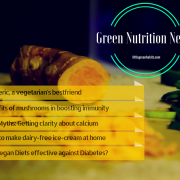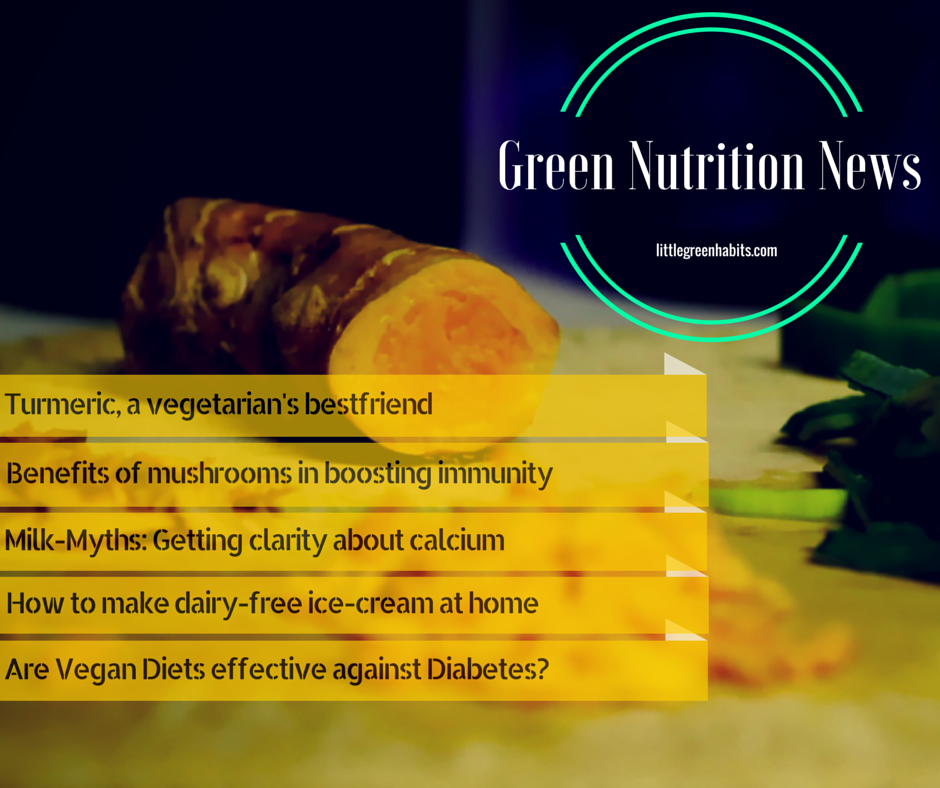Losing Weight On Plantbased Diet
This week my top 5 nutrition news items includes a study that showed people on a vegetarian diet lost more weight than omnivores (vegans lost the most!); a recent case study of a doctor who lost 75 pounds (34 kg) simply by switching to a plant-based diet; research showing that healthy vegan diets can ease the pain and other symptoms of diabetes; further proof that plant-based vegetarian diets boost metabolism (independent of exercise), and evidence that phytates in pulses and beans protect against colon cancer.
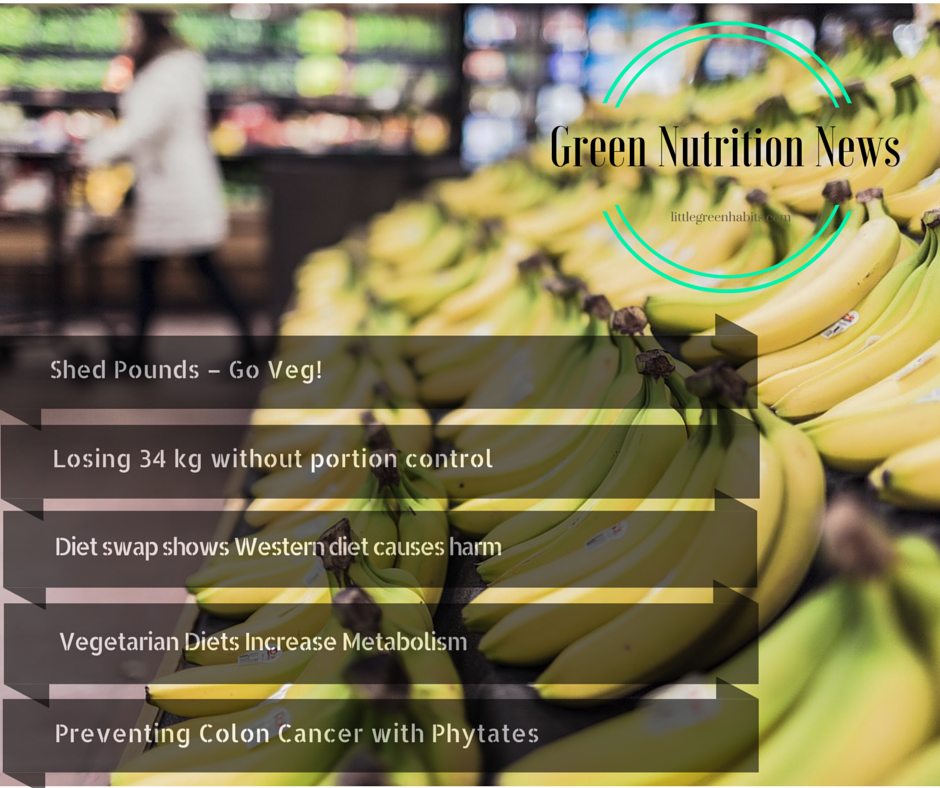
Shed Pounds – Go Veg!
A recent study published online showed that people on a vegetarian diet overall lost more weight than people on an average American diet.
Vegetarian, or plant-based diets have been linked to a decreased risk of type-2 diabetes and coronary heart disease. Recent studies have also showed people can lose weight if they cut out meat.
Researchers affiliated with Harvard University T.H. Chan School of Public Health analysed published clinical trials that looked at the effects of vegetarian diets on weight loss.
The research team focused on lacto-ovo vegetarian diets that allow milk and eggs as well as vegan diets with no animal products, and compared them with non-vegetarian diets. Results of the meta-analysis, published in the Journal of General Internal Medicine, found that those on vegetarian diets lost around 4.4 pounds more than the control group, while those on a vegan diet lost 5.5 pounds.
More Fruit & Veg = Less Calories
One possible reason for the weight loss may be the large amount of fruit, vegetables and whole grains consumed by people on the vegetarian/vegan diets, and the fact the plant-based foods usually have fewer calories than animal-based foods, according to the researchers.
It has been established that whole plant foods like vegetables, fruit and beans have the highest density of nutrients and the lowest calories; not to mention plenty of zero-calorie fibre that helps fill you up without putting on weight. This meta-analysis is yet more proof of what we already know!
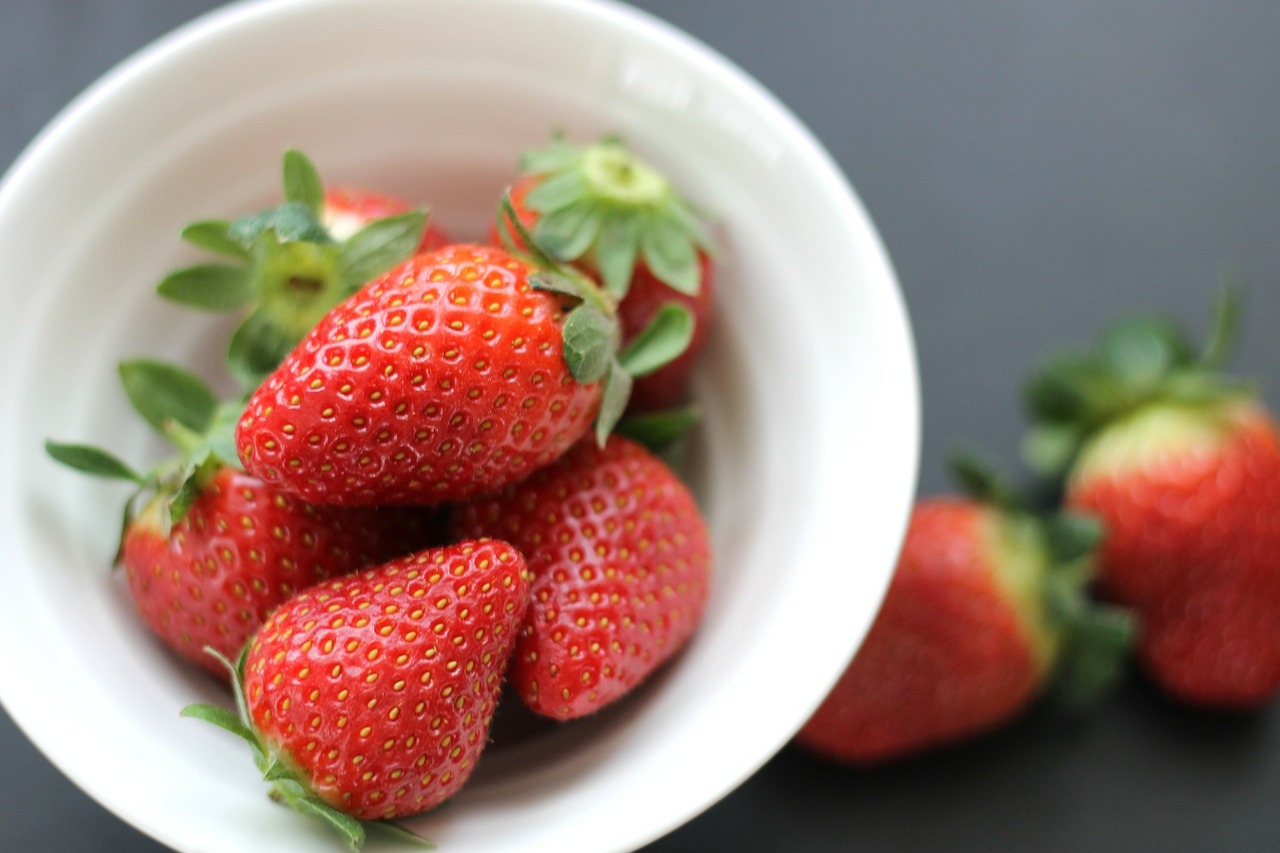
How a family doctor lost 75 pounds without portion control
The Forks Over Knives website recently featured another ‘good-news’ plant-based diet story about a family doctor who rediscovered good health and learned how to get off the ‘weight-loss roller-coaster’.
This 6’2″ (188 cm) doctor, Dr Steve Lawenda, weighed up to 255 lbs (115 kg) at his peak, qualifying him as obese.
Steve only knew of 2 strategies for weight loss: eating less and/or exercising more. Steve found that eating less, namely calorie counting or portion control, repeatedly failed, leaving him hungry and craving more of his favorite foods.
Diets Don’t Work
He found that his weight continually fluctuated over years of intermittent portion control and periods of exercise. As Steve notes, he wasn’t alone following this familiar cycle. Statistics show that calorie-restricted diets fail 95% of the time. In other words, dieting doesn’t work!
Steve found out about the science and logic of a whole-foods, plant-based diet from the book Eat to Live by Dr. Joel Fuhrman; watching the inspirational Forks Over Knives documentary; and later reading books from Drs. Caldwell Esselstyn (Prevent and Reverse Heart Disease), T. Colin Campbell (The China Study), and John McDougall (The Starch Solution).
Eat More (Plants) – Weigh Less
For the first time Steve was aware of a weight-loss strategy that involved eating MORE of something (whole plant foods), not less, and where portion control and calorie counting were not only unnecessary, but discouraged.
Steve was amazed to realize that he could eat as much as he wanted, feel full every day, and yet see his weight drop at such a steady pace. As Steve puts it, this seemed to defy some law of physics; and it felt great!
The end result was that Steve lost 75 pounds (34 kg) with relative ease over eight months, and he has maintained this loss for over a year and a half. Steve now realizes that he wasn’t a failure; the food he was eating failed him.
Steve found that he enjoyed eating vegetables in soups and salads, and came to realize that many of his favorite cuisines, including Italian, Mexican, Chinese, and Thai, had many delicious plant-based dishes. Steve found he could make relatively simple modifications to favorite dishes that still preserved their taste and essence. He even found ways to continue enjoying ice cream and chocolate – with delicious whole-food, plant-based versions of these treats.
As Dr Steve says, “Not only does this lifestyle consistently improve the lives of those making the change, but it also has the potential, over time, to transform healthcare as we know it—reversing obesity and related chronic diseases, and reducing skyrocketing healthcare costs”.

Are Vegan Diets Effective Against Diabetes?
A May 2015 article on the Gazette Review reported on a small pilot study suggesting that switching to a plant-based diet helps ease diabetic neuropathy, which refers to nerve damage and pain caused by the effects of diabetes.
Over half of adults with type-2 diabetes may develop diabetic neuropathy, which occurs when your blood is not circulating normally and has high levels of glucose. This can lead to ulcers and all kinds of infections on the legs and feet, and is the leading cause of limb amputation for those who suffer from the disease.
In this study, featured in the journal Nutrition & Diabetes, and led by doctors and nutritionists at the Physicians Committee for Responsible Medicine (PCRM), researchers chose 17 overweight adults with diabetic neuropathy on a low-fat, high fibre vegan diet for 20 weeks. The group of adults attended nutrition classes every week and took a vitamin B12 supplement, a very important nutrient that is good for the nerves (I take a daily supplement with B12, and encourage other vegans to do the same).
Going Vegan Improves Diabetic Symptoms
The study participants were compared with 17 other adults, who received vitamin B12 but were not on the vegan diet. People on the plant-based diet said they felt better and had less pain. Tests done to these people also showed better blood circulation, improved nerve function, and ability to control their levels of glucose, which helped them to lower the dose of their medication. As an added bonus, the participants lost an average of 14 pounds.
“A dietary intervention reduces the pain associated with diabetic neuropathy, apparently by improving insulin resistance” notes Neal Barnard, M.D., president of the Physicians Committee. “The same diet also improves body weight and reduces cholesterol and blood pressure.”
According to PCRM, 60% percent of diabetes patients suffer from peripheral neuropathy, which is associated with hypertension, obesity, gait disturbances, amputations, anxiety, depression, and reduced quality of life.
“The dietary intervention is easy to prescribe and easy to follow,” says Cameron Wells, M.P.H., R.D., acting director of nutrition education for the Physicians Committee. “Steel-cut oats, leafy greens, and lentils are widely available at most food markets and fit well into most budgets.”
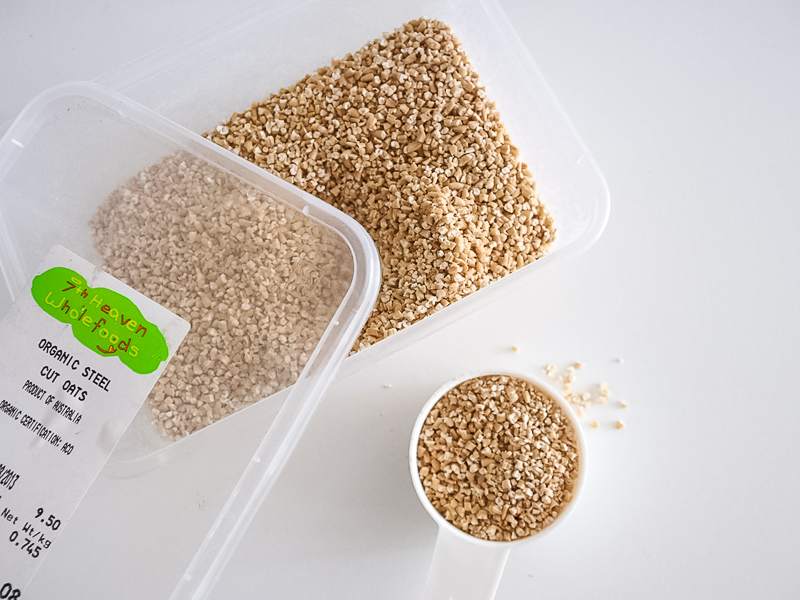
Vegetarian Diets Increase Metabolism
According to a study published in Nutrients in July and reported on PCRM Breaking News online, vegetarian diets are associated with higher metabolic rates. A total of 24 vegetarian and 26 non-vegetarian participants had their diets; metabolic rates; biochemical analyses and inflammatory markers monitored.
Eat Plant-based and Boost your Metabolism by 16%
The study also showed that vegetarians lowered their cholesterol levels and had higher levels of anti-inflammatory cytokines compared with non-vegetarians, and complements other research that shows vegetarian/plant-based diets increase metabolism. Studies carried out by Dr Neal Barnard and the Physicians Committee, and detailed in the 21 Day Vegan Kickstart program, found a 16 percent increase in after-meal metabolism that lasts for about three hours after each meal.
Preventing Colon Cancer – is it Fibre or Phytates?
As Dr Michael Greger of Nutrition Facts advises, the most important environmental risk factor for cancer is diet.
Studies have highlighted the health-promoting plant-based substances known as phytonutrients, which have proven beneficial effects on certain cancers.
Pulses and beans, including chickpeas, split peas and lentils are packed with nutrients, but how do they protect against degenerative disease such as cancer? The reason may be due to non-nutritive compounds, or even so-called “antinutrient” compounds like phytates.
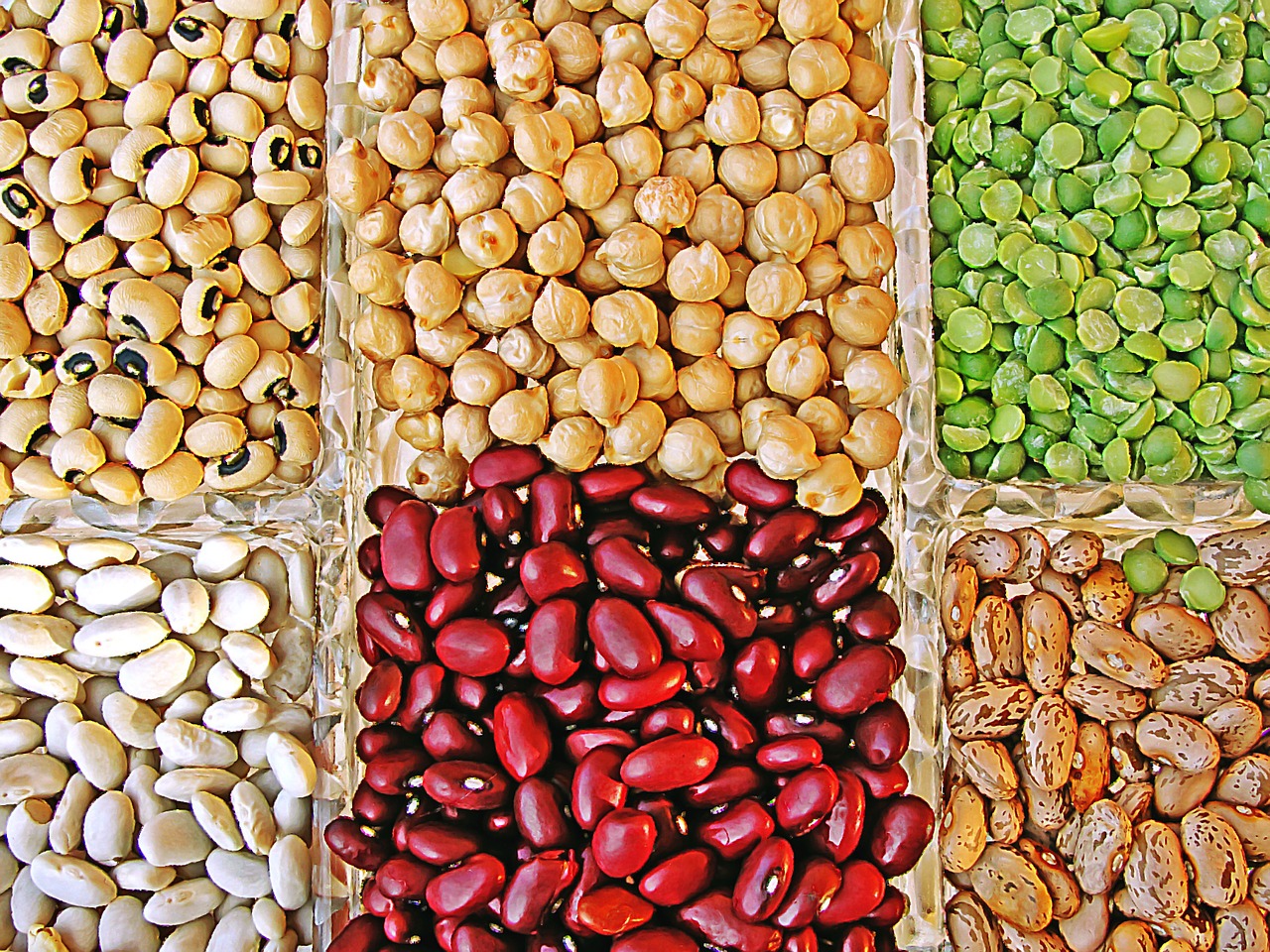
Fight Cancer with Phytates
Previously phytates have been criticized for binding to certain minerals like iron, zinc and manganese and slowing their absorption. However, this dietary feature of phytates may be more of a boon than a burden.
In the US and Australia colon, or bowel/colorectal cancer is the second leading cause of cancer death. This is not the case in parts of world where a predominantly whole-food plant-based diet is consumed.
The famous surgeon Denis Burkitt spent 24 years in Uganda and most of the hospitals he contacted there had never seen a case of colon cancer. Dr Burkitt thought that it was the fibre in the Ugandan’s whole plant foods diet that was so protective.
Some studies have since questioned Dr Burkitt’s theory. For example, Danes appear to have more colon cancer than Finns, yet Danes consume almost twice the dietary fibre.
An Adventist study highlighted in Dr Greger’s video Phytates for the Prevention of Cancer found “excess risk of cancer for higher intakes of both red meat and white meat, suggesting all meats contribute to colon cancer formation — about twice the risk for red meat eaters, and three times the risk for those eating chicken and fish”.
As Dr Greger explains, “phytate is known to be a powerful inhibitor of the iron-mediated production of hydroxyl radicals, a particularly dangerous type of free radical. So the standard American diet may be a double whammy, the heme iron in muscle meat plus the lack of phytate in refined plant foods to extinguish the iron radicals”.
People who eat meat can reduce their risk of colon cancer in two ways: by cutting down on meat; or by eating more beans, which are an excellent source of phytates. To improve your chance of avoiding colon cancer even further, why not do both?
Tom Perry


